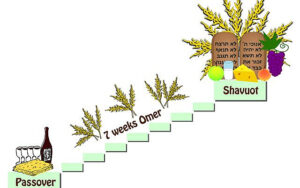Counting the Omer

What is the Omer?
-
-
- Stems from an ancient agricultural practice: Bringing a sheaf (omer) of newly harvested barley, the first crop to be harvested, to the Temple as an offering, each day between the second day of Passover and the day before Shavuot.
- After the destruction of the Temples, evolved into a spiritual practice, intended to help us move from the consciousness of being freed from slavery in Egypt, on Passover, to a state of readiness to once again receive the Torah on Mt. Sinai, each year on Shavuot.
- In the mystical tradition, a period especially propitious for working on our personal qualities, or character. Each week is an opportunity to build a particular quality of character; each day is an opportunity to build on a specific aspect of that quality.
How do you count the Omer (sefirat ha-Omer)?
- Preferably do it at home each night after sundown..
- This year, begins the night of Sunday, March 28, and ends the night of Sunday, May 16.
- Say the prayer before counting the Omer (daily siddur, p. 415).
- Read the day of the Omer (English or Hebrew, daily siddur pp. 416-423).
- We will also count the Omer during morning services, as a second chance for everyone, but without the blessing.
- Some have a custom of keeping a decorative calendar to help remember what day of the Omer it is, available through local and online Judaica stores.
- After counting, many people choose to do a brief personal/spiritual exercise to ground ourselves in the spiritual potential for personal/spiritual development specific to that day of the Omer?
The Spiritual Qualities (sefirot) Corresponding to Seven Weeks of the Omer
In Jewish mysticism, these correspond to seven pathways through which Creator’s energies (you could also say life-force or consciousness) flow into the world and into people. These are not Western or simple concepts; it takes a while to understand them and let them sink in. Through our awareness, intentions, and actions, we can strengthen these qualities in ourselves and improve our character and ways of functioning.
- Week 1: Chesed, lovingkindness, free-flowing love
- Week 2: G’vurah, strength, justice, discipline, judgment
- Week 3: Tiferet, beauty, compassion, balance
- Week 4: Netzach, endurance, prevailing, victory
- Week 5: Hod, simplicity, glory, splendor, sincerity, surrender
- Week 6: Yesod, foundation, committing wholeheartedly to a task to be accomplished
- Week 7: Malchut, majesty, sovereignty, exaltedness, humility
Examples of Day-by-Day Qualities/Week One
- Day One: Lovingkindness in lovingkindness
- Day Two: Strength in lovingkindness
- Day Three: Beauty/compassion in lovingkindness
- Day Four: Endurance/perseverance in lovingkindness
- Day Five: Sincerity and splendor in lovingkindness
- Day Six: Building a foundation in lovingkindness
- Day Seven: Majesty and simplicity in lovingkindness

